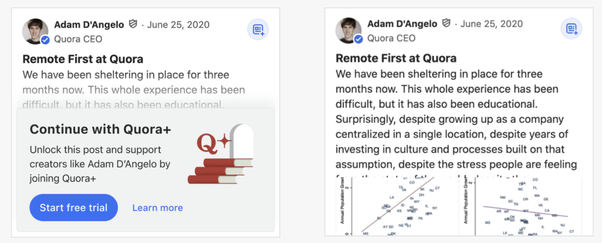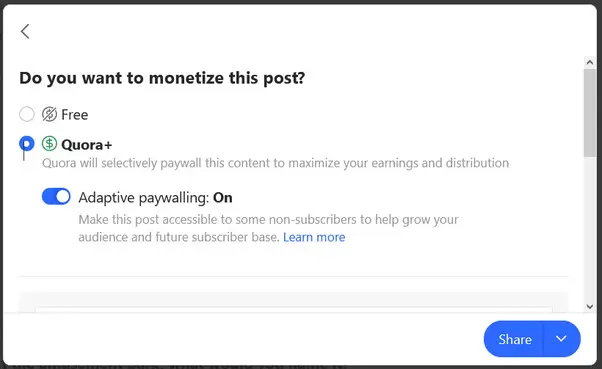New Quora Monetization Strategy for Creators 2022
(Check Eligibility)On August, 5th 2021, Quora launched two new subscription options for creators.
- Quora+ Program
- Space subscription
Obviously a great news for writers on Quora. No greater joy in the digital Space than getting paid while doing what you love.
Quora’s CEO, Adam D’Angelo, added: “We want to make sharing knowledge more financially sustainable for creators, which will in turn let them share more knowledge with the world.”
In this article, we will explain the two new subscription options and wrap it up with the list of eligible countries.
Without further ado, let’s get started.
Quora+ Program
Quora+ is a site-wide subscription product where subscribers pay a $5 monthly fee or a $50 yearly fee.
Subscribers of Quora+ get full access to content from participating writers while sharing revenue with participating creators based on members’ engagement with their work.
In a nutshell, subscribers of Quora+ can:
- Enjoy unlimited access to subscriber-only content
- Access a selection of exclusive Spaces content
- Invest in the pursuit of knowledge and content that matters.
The revenue generated from subscribers will be distributed to creators “in proportion to the amount each subscriber is consuming their content, with more of a subscriber’s contribution going to writers and spaces the subscriber follows.”
This is similar to Medium’s paywall model where paying subscribers get access to all the content on the platform. But while Medium is ad-free, Quora generates it’s major revenue from ads.
It will interest you to know that creators can also earn a referral bonus for every paying subscriber who signs up for Quora+ by clicking through from one of your paywalled answers.
So does this mean that free users on Quora can’t view content that has been paywalled by Quora writers?
Not really; Quora adopts a monetization system called the “Adaptive Paywall.”
How does the adaptive paywall work?
Unlike a traditional paywall that would prohibit all subscription content views from non-paying subscribers, the adaptive paywall will regularly show a selection of paid content for free to non-paying subscribers.
While some sites tightly restrict access to all content after a non-paying reader hits a limit (for example, 10 free articles per month), the adaptive paywall works in a way that allows non-paying readers to still see the majority of content for free, showing the paywall only intermittently while scrolling through monetized content in their feeds or Spaces.
For creators, the adaptive paywall’s algorithm is designed to balance free content views and earnings on each post.
This keeps your content accessible to as many users and followers as possible — including many without paying subscriptions — while supporting opportunities to earn revenue as paying subscribers read and engage with your work.
The point of the adaptive paywall is to show that content to as many people as possible so that a writer can increase subscribers and earn money at the same time.

So does this mean that free users on Quora can’t view content that has been paywalled by Quora writers?
Not really; Quora adopts a monetization system called the “Adaptive Paywall.”
How does the adaptive paywall work?
Unlike a traditional paywall that would prohibit all subscription content views from non-paying subscribers, the adaptive paywall will regularly show a selection of paid content for free to non-paying subscribers.
While some sites tightly restrict access to all content after a non-paying reader hits a limit (for example, 10 free articles per month), the adaptive paywall works in a way that allows non-paying readers to still see the majority of content for free, showing the paywall only intermittently while scrolling through monetized content in their feeds or Spaces.
For creators, the adaptive paywall’s algorithm is designed to balance free content views and earnings on each post.
This keeps your content accessible to as many users and followers as possible — including many without paying subscriptions — while supporting opportunities to earn revenue as paying subscribers read and engage with your work.
The point of the adaptive paywall is to show that content to as many people as possible so that a writer can increase subscribers and earn money at the same time.

Space Subscription
The second monetization option is to set up a Space for people to subscribe specifically to creators/writers’ content.
Spaces allow people to curate collections and form communities around shared interests and tastes.
As the Space owner, you will determine your Space’s monthly or yearly subscription fee. Subscribers will pay the set fee you decide, and payouts will be issued monthly.
Regardless of the set price, 5% of the fee goes to Quora, while 2.90% of the fee plus $0.03 per transaction will go to Stripe, a third-party company that Quora uses to process payments.
With Space subscriptions, you will choose which content to show to everyone and which to make exclusive to subscribers.
Earnings Program Eligible Countries
Unfortunately, not everyone can participate in Quora’s new subscription option, only a handful.
Space subscriptions is only available in English to creators who are residents of one of the 25 countries below:
- Australia
- Belgium
- Canada
- Denmark
- Finland
- France
- Germany
- Hong Kong
- India
- Indonesia
- Ireland
- Israel
- Italy
- Malta
- Mexico
- Netherlands
- New Zealand
- Norway
- Portugal
- Singapore
- Spain
- Sweden
- Switzerland
- United Kingdom
- United States
According to Adam D’Angelo, Space subscriptions will expand to more languages and countries over time.
To test-run Quora+, a participation invite was sent to a selected group of writers on Quora.
At this point, the basics of selection is not known and appears somewhat random since a couple of new Quora writers received invites alongside top writers on Quora.
However, it is expected to expand over time as Quora learns about what works for subscribers and creators.
Adam D’Angelo: “We expect to learn a lot from this launch and will be working hard to adapt based on these learnings, continuing in our goal to make this the best place to write on the internet.”
See our recently published article on Quora’s safety and security through the link below.
